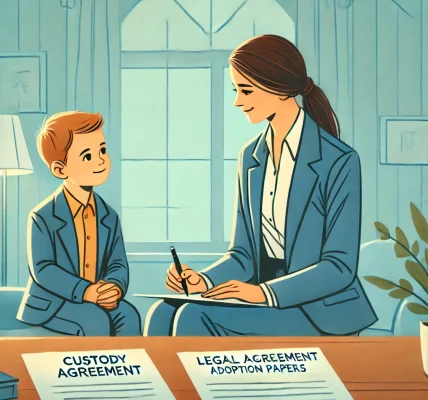Introduction
Blended families are becoming increasingly common, making it essential for step-parents to understand their legal rights and responsibilities in matters of custody and child support. While biological parents typically have primary legal rights, step-parents can also play a significant role in a child’s life and may have legal options to seek custody, visitation, or even financial responsibilities.
This article explores the legal rights of step-parents in custody and child support cases, providing insights into how step-parents can protect their interests while ensuring the child’s best interests remain a priority.
Understanding the Legal Status of Step-Parents
Unlike biological parents, step-parents do not automatically have legal rights over a child. Their rights are generally derived from marriage to one of the biological parents and any agreements made during or after the marriage. However, in some cases, step-parents may obtain legal recognition through adoption or court rulings.
Key Legal Considerations:
- Step-parents are not automatically granted legal custody rights.
- Their ability to seek custody or visitation depends on state laws.
- Courts prioritize the best interests of the child when making decisions.
Step-Parent Custody Rights
In most cases, biological parents have primary custody rights. However, step-parents can seek custody in certain situations, especially if they have played a parental role in the child’s life for an extended period.
When Can a Step-Parent Seek Custody?
Step-parents may be able to seek custody in the following situations:
- The Biological Parent is Unfit: If the biological parent is unable to care for the child due to neglect, abuse, or incapacity, a step-parent may petition for custody.
- The Other Biological Parent is Absent: If one biological parent has abandoned the child or is deceased, the step-parent may be granted custody if it is in the child’s best interests.
- Established Parent-Child Relationship: Courts may recognize the emotional and psychological bond between a step-parent and the child, giving the step-parent a legal standing to seek custody.
How to Obtain Custody as a Step-Parent
If a step-parent wishes to obtain custody, they must:
- File a petition in family court.
- Provide evidence that living with them is in the child’s best interest.
- Show that the biological parent is unable or unwilling to care for the child.
Courts assess various factors, such as the child’s relationship with the step-parent, financial stability, and the emotional impact of changing custody arrangements.
Step-Parent Visitation Rights
Even if a step-parent does not obtain custody, they may still seek visitation rights, especially if they have developed a strong parental bond with the child.
When Can a Step-Parent Request Visitation?
- If they have been a significant part of the child’s upbringing.
- If denying visitation would harm the child’s emotional well-being.
- If the biological parent agrees to grant visitation rights.
How to Obtain Visitation Rights
To secure visitation rights, a step-parent must:
- File a petition in family court.
- Demonstrate that visitation serves the child’s best interests.
- Provide evidence of their active involvement in the child’s life.
Step-Parents and Child Support Obligations
In most cases, step-parents are not legally required to pay child support unless they have legally adopted the child. However, there are some exceptions where they may be held financially responsible.
When is a Step-Parent Required to Pay Child Support?
- Adoption: If a step-parent legally adopts the child, they assume full parental responsibilities, including financial support.
- Legal Agreements: If the step-parent has signed an agreement promising to support the child financially, they may be held accountable in court.
- State Laws: Some states impose financial obligations on step-parents if they have acted as a primary caregiver for a significant period.
How Can a Step-Parent Protect Their Financial Rights?
- Consult a family law attorney before making financial commitments.
- Ensure any agreements regarding child support are legally documented.
- Understand state laws regarding step-parent obligations.
Step-Parent Adoption: A Permanent Legal Solution
If a step-parent wants full legal rights over a stepchild, adoption is the best option. Once a step-parent adopts a child, they gain all the rights and responsibilities of a biological parent, including custody and child support obligations.
Process of Step-Parent Adoption
- Consent from the Biological Parent: The non-custodial biological parent must usually give up their parental rights.
- Legal Petition: The step-parent files an adoption petition with the court.
- Background Checks: Courts may require background checks to ensure the step-parent is fit for adoption.
- Court Hearing: A judge reviews the case and grants or denies the adoption based on the child’s best interests.
Once an adoption is finalized, the step-parent assumes full parental rights and responsibilities, including inheritance rights and child support obligations.
Conclusion
Step-parents play a crucial role in blended families, but their legal rights regarding custody and child support vary based on state laws and individual circumstances. While they do not automatically have custody rights, they may seek legal custody or visitation if it is in the child’s best interest. Additionally, step-parents are generally not responsible for child support unless they have adopted the child or entered into a legal agreement.
If you are a step-parent navigating custody or child support issues, consulting a qualified family law attorney can help clarify your rights and responsibilities. Understanding the legal landscape ensures that both the child’s well-being and your parental role are protected.
Need Legal Guidance? If you have questions about your rights as a step-parent, seek professional legal advice to ensure the best possible outcome for you and your stepchild.




